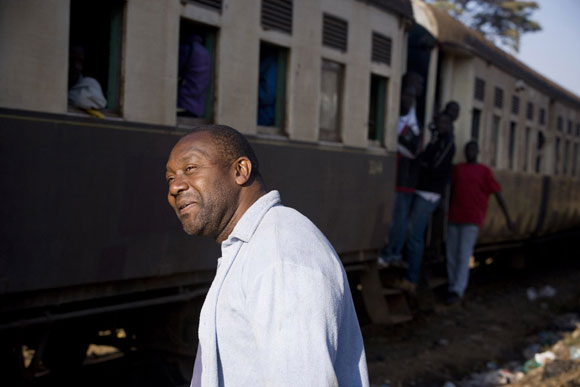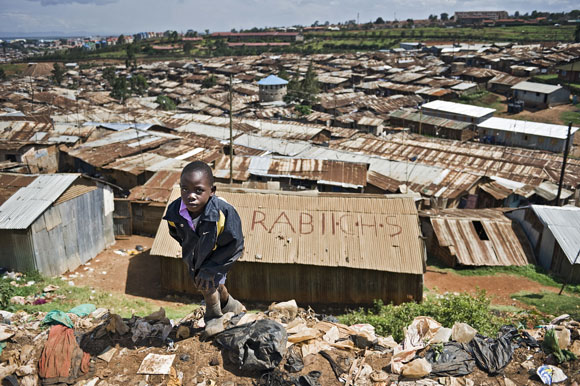As most people who have ever watched Comic Relief will know, I’ve been to Africa many times before.
I’ve reported on the destruction wreaked by the HIV/AIDS pandemic, on drought, on famine, on kids forced to live on the streets and the devastation that conflict inevitably leaves in its wake.

Right from the off though I knew this trip would be different. I was going to live for a week in Kibera slum in Nairobi, Kenya. But as it turned out I’d underestimated massively just how different it would be.
Every time I’d been on a Comic Relief trip before I’d been supported. I’d been part of a bigger group and while you’re invited into people’s homes to find out about their lives and their situations, at the end of the day you leave where you’ve been filming, and never have to truly live and breathe the conditions they’re in day in and day out.
This time I wasn’t going to be on the outside looking in, and I wasn’t going there to be a tourist. I was to spend time LIVING on the inside of Africa’s biggest and worst slum looking out – and despite all of my African experiences in the past, the prospect really scared me.
I had to work to pay my way and it was hard. I got up at 5am to make samosas and sold them all day until 7pm. The next day I worked as a coal man and the next day I worked fetching several gallons of water at a time. I threw myself into a gruelling work schedule. There was nothing touristy about it, believe me.
I have to say, I was concerned that it would be difficult to fit in as a genuine slum dweller – while you might think I wouldn’t stand out, for example, as much as a young white woman, I was being followed by a largely Caucasian film crew for most of the time. Although I have to say, aside from my frame (I’m 6”2 and huge!) people generally ignored me.

Kibera is a place that is legendary for all the wrong reasons. Situated on the outskirts of the Kenyan capital Nairobi, it is one and half square miles of festering dump that is said to be home to an astonishing million people. With no real sanitation - and little or no power - it is as close to hell as you’ll ever want to get.
I was told that I was to spend the night with a family of five orphans who had lost their mum to AIDS and their dad to the political violence that erupted in Kenya a few years ago. In my time supporting Comic Relief, I’d heard tragic stories like this before – but what I wasn’t prepared for was where these kids - and now me - called home.
With infrequently emptied pit latrines being the only toilets available to the residents of Kibera – each one servicing up to a thousand people in some areas – this is a place which has a permanent stench.
Despite that, when the oldest boy Bernard walked me down a narrow corridor, past two hideously overflowing toilets to reveal the tiny room that he shares with his brother and three sisters - I was shocked to the core.
Never in all of my time in Africa had I seen or smelt anything like this. The raw waste was running from the oozing hole in rivulets across the corridor and into their windowless prison of a room.
These youngsters who had faced untold tragedy and heartbreak already in their young lives were now having to live in conditions that were beyond appalling, beyond dire, beyond anything I’d ever seen or imagined.
This isolated and abandoned family is cared and provided for solely by Bernard. He's a teenager with more on his 16-year-old shoulders than you can possibly imagine. At the age of 12 he had to identify his father’s mutilated body – something he has clearly never recovered from.
A bright, funny and gentle lad, his dream of being an engineer is being eaten away day by day. Rather than getting the schooling he needs he spends his days sifting through rubbish and human faeces for plastic bottles that he can sell to earn the pittance he needs to put food on the table for his siblings.
Bernard is trapped and without an education he always will be – and what’s worse he knows it. At 16 he is making the ultimate sacrifice, giving away his future to secure the here and now for his brothers and sisters.
But there is a path out of Kibera slum for Bernard and his siblings. It's via an education. With a chance to learn, he can build the skills he needs to read, write, get a job and become the engineer he dreams of.
That's why Comic Relief has been supporting education projects across Africa for over 20 years now. It's a long journey, but one which could take Bernard from the day-to-day grind that I have shared with him (if only for a few days) to a future where he can lift his family out of poverty.
-------------------------------------------------------------------------------------
This Red Nose Day, the UK Government has promised to help Comic Relief to do even more and has backed the public's incredible support for this year's campaign with £10m for Comic Relief's work in improving health and education across Africa. This contribution by the government matches Comic Relief's own commitment to spend £10m, allowing it to double its efforts in these areas. Find out more at www.dfid.gov.uk/RND2011
Please note, this is a guest blog. Views expressed here do not necessarily represent the views of DFID or have the support of the British Government.

7 comments
Comment by Julia posted on
I watched the documentary on Lenny and the 3 other british celebrities time in Kibera and found it shocking and moving in equal measure. Thanks to the team for bringing this to mainstream TV screens - however difficult parts of it were to watch.
Comment by Dorrie Alderman Blakney posted on
Heartbreaking...Got to your blog by accident. Can I post this on FB I'm wondering? How can we begin by helping Bernard and his siblings?...Please contact OPRAH...Your documentary should be shown in America. Please contact PBS (the Public Broadcasting Station.) Headquartered, I think, in NYC.
Comment by Short-term mission round up 4 « Slack Alis Travels posted on
[...] Could you live like a local in Africa’s biggest slum? is a moving blog by Lenny Henry about living in Kibera. [...]
Comment by Robert posted on
I have also been watching with amazement that fellow human beings are living like this when we are able to take so much for granted.
I would like to see the governments around the world agree upon an 'optional' say 1% world wide tax and this money used solely to improve the lives of this people. Politicians must get involved NOW!
It is not acceptable in this day and age that people have to live like this.
Well done celebs and BBC for bringing this to our attention.
Comment by mary posted on
Wat struct me was how with all the aid which has been donated there are still children living next to leaking latrines. and how the ' helpers 'were allowin it and how it was only when Lenny Henry got in there that they 'found ' at a price some where for those children to move to, or was it just a set up in any way somrthing was very wrong there .
Surley the first thing that should be donewith the money is to sort out the sanitation which would also give jobs to the men.
I am horified by these helpers and lenny henry should surely have realised somthing is going on and needs to be stopped imediatly.
It is because of this kind of thing I only give to a family run african charity.
Comment by mary posted on
Wat struck me was how with all the aid which has been donated there are still children living next to leaking latrines. and how the ' helpers 'were allowing it and how it was only when Lenny Henry got in there that they 'found ' at a price some where for those children to move to, or was it just a set up in any way something was very wrong there .
Surely the first thing that should be done with the money is to sort out the sanitation which would also give jobs to the men.
I am horiffied by these helpers and Lenny Henry should surely have realised something is going on and needs to be stopped immediatly.
It is because of this kind of thing I only give to a family run african charity.
Comment by bharati posted on
The real aid that is needed is very simple: not education, food, sanitation or ecological practices but planning for the future with birth control and sterilization, especially male, where possible and practical. Yes, current urgent needs must be taken care of but never without emphasizing and reemphasizing birth control. That is the real solution for many human problems across the globe.